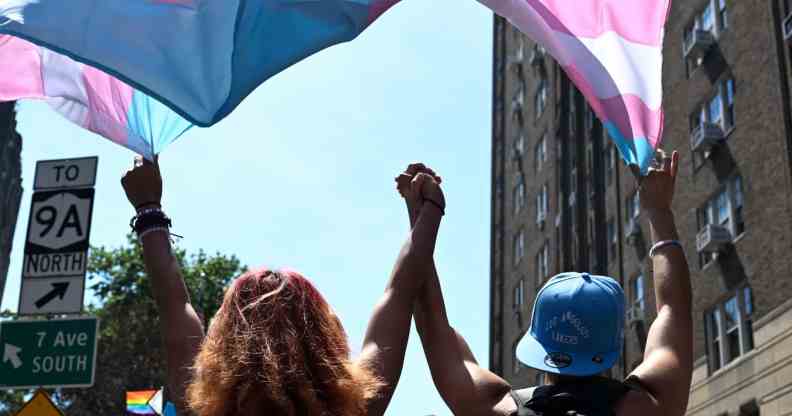Most anti-trans adults don’t actually know a trans person in real life, new study reveals

A new study shows that most people who hold anti-trans views don’t actually know a trans person in real life. (Alexi Rosenfeld/Getty)
A new study shows that most people who hold anti-trans views don't actually know a trans person in real life. (Alexi Rosenfeld/Getty)
A new study has revealed that most anti-trans young adults do not know any trans people in real life, and that having a trans person in your life greatly increases the chances of someone becoming a trans ally.
The study, shared on Friday (31 March) for Trans Day of Visibility, comes as part of a report by LGBTQ+ youth charity Just Like Us.
Of the 3,695 18-25-year-olds surveyed, 74 per cent who said they did not support trans people also admitted they did not know a trans person.
Detailing key insights about trans allyship, the research found that personally knowing a trans person doubles the likelihood of trans allyship.
The study also revealed that nearly 70 per cent of non-LGBTQ+ young adults were supportive of trans people.
Of the 89 per cent of LGBTQ+ young adults who said they were supportive of trans people, lesbians were most likely to say they both know a trans person (92 per cent) and express support for trans people (96 per cent).
Amy Ashenden, interim CEO of Just Like Us, said: “We hear so much in the news and daily life now that is negative about trans people, and now the research shows that much of this negativity stems from not even knowing a trans person in real life.
“There is fear in the unknown … We’ve seen in the past how homophobia has been largely driven by fears of the unknown and sadly history is repeating itself.”
Ashenden said she is “delighted” to see high rates of support by lesbians in the LGBTQ+ community.
“As a lesbian myself, I know just how supportive our community is towards our trans siblings and it’s fantastic to finally have the evidence to demonstrate this – lesbians and trans people stand in solidarity together. We always have done.”
The study illustrates that while there is room for much joy and celebration this year, there is still more work to be done.
In a climate of rampant anti-trans violence and hostility, visibility can be both a victory and a risk. Elliot Kwabena Akosa, an ambassador for Just Like Us, wrote for PinkNews that visibility can be a “double-edged sword”.
“Coming out has the power to show other people that being different is not only a possibility, but a strength. It also has the power to expose you to reactions that could be hurtful, or even dangerous,” he said.
“The effects of daily transphobia in our society are profound and deadly. To disclose one’s transness is to be profoundly vulnerable, and to be visible sometimes means taking an immense risk.”
While Just Like Us’ survey shows that anti-trans views often go hand-in-hand with not knowing any trans people, Kwabena Akosa asserts that trans visibility is not always a simple remedy to this – it is not always accessible, comfortable or safe.
“Visibility is a risk that not everyone is willing to take,” he wrote. “This year, I’m choosing to honour and celebrate those who cannot be front-and-centre in our struggle. Knowing, accepting and loving yourself is a radical act in a society that others us. Let that be your defiance.”
Just Like Us’ full report on the experiences of young LGBTQ+ adults in the UK is due to be released in June 2023.

